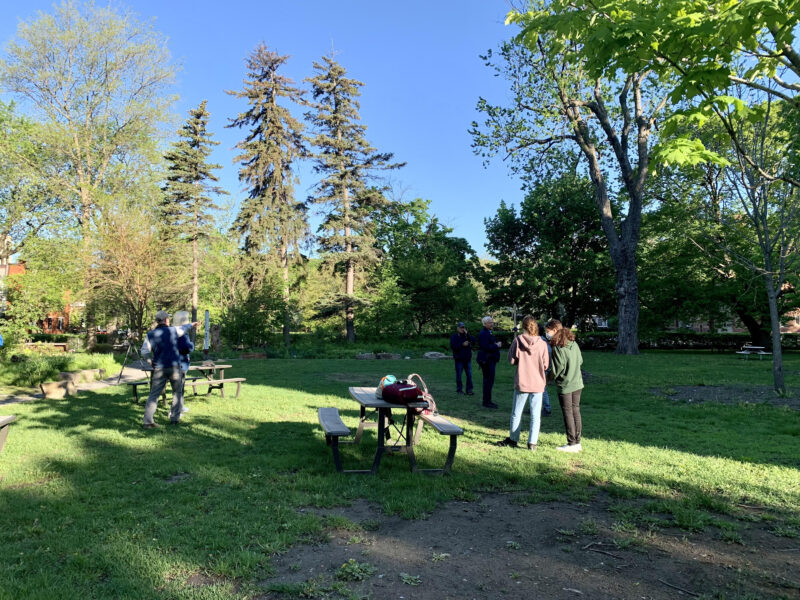Dawson reimagining the College landscape
When one thinks of college campuses, images that come to mind may include manicured lawns, park benches and perhaps an institutional shrub garden and flag pole near a main entrance.
About a year ago, Dawson’s Sustainability Advisory Committee began a series of brainstorming sessions to re-imagine the campus and outdoor spaces. This process has culminated in a series of drop-in sessions and meetings over the last academic year that have generated interesting ideas to consider for the future of the campus.
To date, about 60 Dawson employees from all sectors of the College, including the entire Physical Education Department, have given input as have about 50 students who dropped by a booth set up on Feb. 6. In addition, councilors and staff of the City of Westmount have also been consulted and are enthusiastic about the project.
Input from the Dawson community
“For the first time, our community was invited to provide feedback about the way our campus and outdoor spaces, including our rooftops, are designed and used,” said Chris Adam of the Sustainability Office.
Currently, the campus looks quite similar to how it did more than 100 years ago when the property was the motherhouse of the Congrégation de Notre-Dame. The circular drive that wraps around the front of the building was there, today’s large trees were smaller and of course, there was grass.
The Dawson community has shared many ideas, including:
- Creating more areas to sit or meet
- Establishing walking trails through the campus
- Dedicating space for permanent or seasonal outdoor classrooms and events
- Setting up physical fitness stations for students and staff or climbing boulders
- Developing more microhabitats, such as a native edible forest and wetlands
- Increasing recreation opportunities by installing more basketball nets, painting lines to create courts on existing pavement, clearing open areas for games
- Encouraging active transport, such as installing modern bike racks with shelters
- Planting more trees, food and flower gardens
All of the ideas received are being synthesized by the Sustainability Advisory Committee and will be considered in the process of writing recommendations to the landscape architecture firm that is currently developing a new master landscape plan for Dawson.
More microhabitats will be part of the plan
The creation of new microhabitats will be essential to promote biodiversity and attract more species to the campus. In December 2022, the College committed, as a founding member of the Nature Positive University Alliance, and announced at COP-15 in Montreal, to promote Nature on our campus. This spring, the College will launch its 1,000 species in 1,000 days initiative.
“It is time to change how we view the college landscape. Our new campus needs to be a beautiful expression of well-being for all, which is a core value of Dawson,” said Wai Bong Shum, Director of Facilities Management. “Well-being for all gives us a foundation for the new plan and a vision for creating a landscape that meets the needs of the environment, students and staff.”
Implementation beginning this summer
The Sustainability Advisory Committee expects to provide recommendations to the firm this spring. The community can expect to learn more about the plans as the project moves forward. Implementation is expected to begin over the summer months and will continue over several years.
Members of the Dawson community who would like to give ideas are still welcome to submit them by email to sustainability@dawsoncollege.qc.ca before March 22.
The Sustainability Advisory Committee includes a cross-section of the College community: Chris Adam (Sustainability Office), Anna-Liisa Aunio (Faculty, Sociology), Jesse Binstock (Continuing Education and Community Services), Tiawenti:non Canadian (First Peoples’ Centre/Student Services), Jenn de Vera (Sustainability Office), Gisela Frias (Faculty, Geography), Cathy Giulietti (Academic Administration), Azra Khan (Human Resources), Geoff Kloos (Student Services), Sophie La Font (Sustainability Office), Julia Lijeron (Office of Academic Development), Ian MacKenzie (Faculty, English), Brian Mader (Faculty, Biology), Tim Miller (Faculty, Physiotherapy), Christina Parsons (Communications Office), Diana Rice (Office of Academic Development), Benjamin Savard (Dawson Student Union) and Doug Smyth (Faculty, Physical Education).



